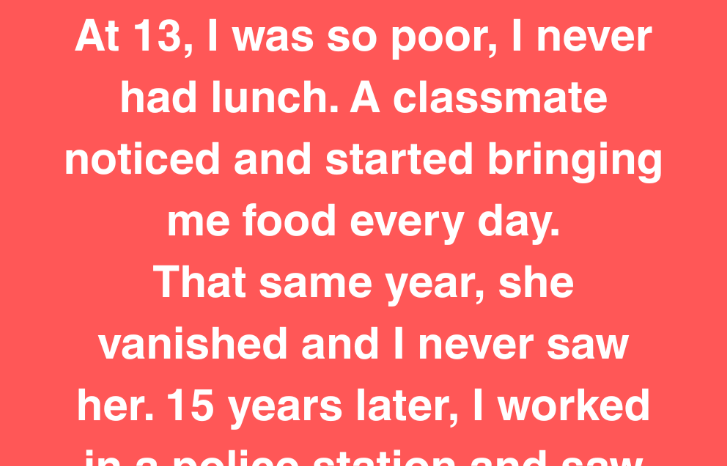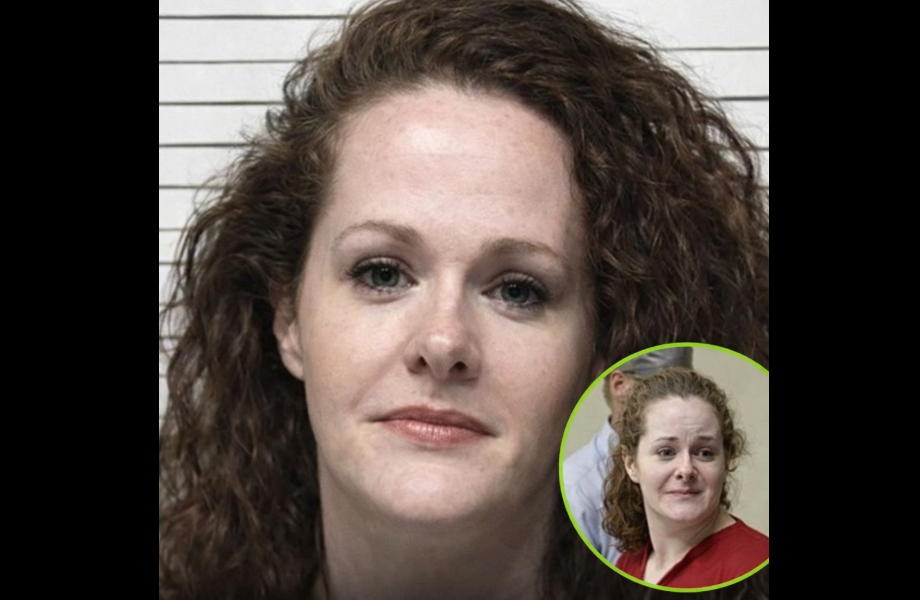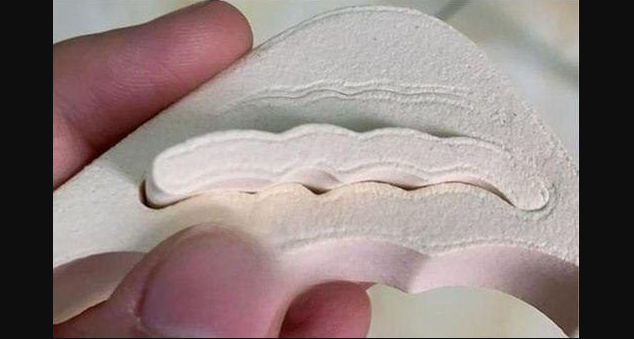At 13, I faced such poverty that lunch was a luxury I couldn’t afford. A classmate, Nayeli, noticed my hunger and began sharing her food with me every day. That same year, she disappeared without a trace, leaving me with only memories of her kindness. Fifteen years later, while working as a probationary detective in a Santa Clara police station, I saw her name on a schedule for questioning.
When she walked in, I stood frozen. Her warm eyes hadn’t changed, but everything else about her was unfamiliar. Her name, Nayeli, was so distinctive that it stayed etched in my mind, as vivid now as it was back then. I never doubted her existence, even when her absence made it feel like a dream.
The last time I saw her, we sat behind the school gym, dividing a sandwich she claimed her mom made “by accident” with extras. Her family always seemed elusive—no social media, no presence at school events, no photos in the yearbook. Then, one Monday, she was gone. No explanation. No farewell. The school mentioned a “sudden move,” but the teacher’s uncertain tone left me questioning.
Her kindness lingered in my memory, not because of some grand gesture, but because she showed me care when no one else noticed. Beyond the food, she folded napkins into playful shapes to spark my laughter. She framed our meals as her needing help to finish, sparing me the sting of charity. Living with an uncle who barely acknowledged my presence, her small acts carried a weight she likely never realized.
Now, in the police station, I sat behind the one-way glass, watching her enter. The case involved a stolen identity report—routine, involving credit cards opened in a woman’s name. But seeing Nayeli’s name made my heart pound like I was still that kid waiting by the gym. She sat across from my partner, Brian, composed yet cautious. Her hair, once braided with bright ribbons, was now short and dark. Her thrift-store jeans and navy sweater hinted at a life of careful choices, but her posture suggested hidden depths.
I stayed quiet behind the glass, wrestling with my professionalism. Her hands, though—those same slender fingers, still bitten nails—betrayed her familiarity. Brian kept the questioning light. “You’re not in trouble. We need clarity on these credit cards,” he said. Nayeli nodded curtly. “It’s my mom. She’s the one using my identity.”
That detail wasn’t in the report. Brian leaned forward. “Your mother’s behind this?” he asked. She exhaled, glancing toward the camera as if sensing my presence. “It’s complicated. People don’t usually believe it,” she said. I stepped away, splashing cold water on my face to steady myself.
Later, I asked Brian if I could handle the follow-up. He agreed, noting, “Something’s off with her story, but she’s telling the truth.” I sent her a text from the station’s number: “This is Officer Solares. I’d like to hear your perspective fully.” Her reply came quickly: “Okay. But not at the station. Still like grilled cheese?” My throat tightened. That sandwich—our shared history.
We met days later at a small diner near downtown. She was already there, stirring coffee, twirling her spoon. Our eyes met, and we paused, taking each other in. “I didn’t think you’d remember me,” I admitted. “I never forgot,” she replied. “How could I?”
We avoided the case at first, catching up in fragments. Silences stretched, filled with unasked questions. Finally, I said, “Where did you go?” She stirred her coffee slowly. “My mom got scared. Thought CPS was closing in. We left that night.” “Because of you?” I asked. “No,” she said. “Because of her. We weren’t legal then. She feared they’d uncover her papers, everything.”
I sat speechless, realizing I’d waited fifteen years for this conversation. “So, she’s using your identity now?” I asked. Nayeli leaned closer. “Yeah. She has my social security copies. Opened two cards in my name. Used them. Defaulted.” “Why report it now?” I pressed. “I’m trying to get my own place,” she explained. “Applied for a rental, got denied. Found out I had $12,000 in debt I didn’t create.”
I hesitated. “Can you talk to her?” She gave a hollow laugh. “She doesn’t care. Says it’s ‘family debt’ and I should be grateful for a credit file.” I wanted to reach out, to hold her, but instead I said, “We can build a case. But if she’s undocumented…” “I know,” she interrupted, voice breaking. “I don’t want her deported. I need my life back.”
We proceeded carefully. I helped her gather evidence, compile statements, and send letters to credit bureaus. She remained patient through the slow process. Over those weeks, we saw each other more—not romantically at first, simply reconnecting, piecing together the years apart. I learned she worked two jobs, supported her brother’s college education, painted sunsets, and only drank coffee after 5 p.m.
One evening, parked outside after takeout, she looked at me and said, “I used to think you were my project. But I think I needed you more.” Words failed me; I took her hand.
Then came an unexpected turn. A colleague from Fresno called about a woman arrested for using a fake ID at a bank, claiming to be Nayeli Cortez. I requested a photo. It was her mother—older, weary, but with those same eyes. I drove to the station, unsure of my words. When I entered the holding room, she looked at me and said, “So, she sent you.” “She didn’t know,” I replied. “Not until now.”
Her expression softened. “She’ll never understand why I did it.” I asked her to explain. She revealed the debt was for her son’s tuition, not personal gain. She used Nayeli’s name because her own credit was exhausted. She planned to repay it, but work vanished, and debts grew. “I raised them alone,” she said. “Cleaned houses, cooked in restaurants. Kept them fed. I needed help.” “I understand,” I said. “But this isn’t the way.” She nodded. “Tell her I’m sorry. And tell her… she was always the strongest.”
Her words hit hard. I relayed everything to Nayeli. She grew quiet, processing. “Do you want to see her?” I asked. She shook her head. “Not yet.” But a week later, she did. They met in the visitation room. Nayeli later shared that her mother apologized—truly, for the first time. “She said she was proud of me,” Nayeli whispered. “I never expected that.”
Things changed after that. The arrest helped clear Nayeli’s name. Creditors relented, her credit score improved, and she secured a small apartment. She invited me to paint it with her, choosing sunset orange for the walls.
A year later, we began dating for real. Now, we share a home. Her brother graduates next spring. Her mother, after a short sentence, works again—legally this time. They talk twice weekly. Sometimes, I sit on our small balcony, eating grilled cheese, reflecting on how it all began with a shared lunch.
Life weaves strange circles. The kindness you offer can return, even after fifteen years. So, feed the hungry kid. Respond to the unexpected message. The past may resurface, not to wound, but to mend.
If this story moved you, please share it. You never know who might need a reminder of kindness today.






